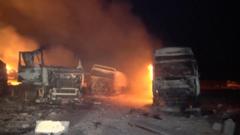As the second round of nuclear negotiations between the United States and Iran approaches, optimism is overshadowed by military posturing and inconsistencies in communication from both sides.
Negotiations Strained as Militaristic Rhetoric Escalates Ahead of Iran Nuclear Talks

Negotiations Strained as Militaristic Rhetoric Escalates Ahead of Iran Nuclear Talks
High-stakes discussions in Rome face challenges from military threats and conflicting messages.
In detail, the US and Iran are gearing up for their much-anticipated nuclear talks this Saturday in Rome amidst a backdrop of increasing military threats and contradictory statements from key figures, particularly US President Donald Trump. Despite earlier assertions of potential military action from Israel, Trump expressed that he would like to explore diplomatic avenues before resorting to force. The discussions follow the inaugural round of talks held in Oman last weekend, which both sides previously termed as constructive.
The negotiations stem from the fallout of Trump's 2018 withdrawal from the 2015 nuclear agreement, which had permitted Iran to develop its nuclear technology in exchange for sanctions relief. Since then, tensions have soared, with Iran ramping up its nuclear activities in what it describes as a response to the US's stringent sanctions. As it stands, Iran’s stockpile of highly enriched uranium has raised alarms regarding its nuclear ambitions.
Iran has purportedly returned to the negotiating table not due to fear of military repercussions, as emphasized by its Supreme Leader Ayatollah Ali Khamenei, but rather because the US's focus has narrowed specifically to nuclear issues. Nevertheless, the likelihood of reaching a satisfactory agreement remains dim, with mistrust on both sides running high.
US Special Envoy to the Middle East, Steve Witkoff, noted on social media that any final agreement must ensure regional peace by demanding the cessation of Iran's nuclear enrichment program. However, he later suggested that there might be room for limited uranium enrichment, raising eyebrows in Tehran. Iranian Foreign Minister Abbas Araghchi responded to these mixed messages by asserting that the principle of enrichment itself is non-negotiable.
In a bid for a more stable regional footing, diplomatic overtures continue, including recent visits by the Saudi Defence Minister to Tehran and a trip by Araghchi to Moscow to strengthen ties with Russia, amid allegations of Iran supplying military drones for the Ukraine conflict.
Much pessimism also surrounds the negotiations due to the history of distrust stemming from Trump's withdrawal from the nuclear deal and subsequent military interventions. Khamenei has signaled cautious optimism regarding the talks, though he remains wary of the US's intentions, signaling that any aggressive actions could provoke severe consequences.
The environment surrounding the negotiations is convoluted: the US claims the dialogues are direct while Iran insists they are indirect, facilitated by Oman. Public sentiment in Iran is caught between economic grievances and international pressures, with the regime’s stability also at stake as protests loom on the horizon.
The negotiations stem from the fallout of Trump's 2018 withdrawal from the 2015 nuclear agreement, which had permitted Iran to develop its nuclear technology in exchange for sanctions relief. Since then, tensions have soared, with Iran ramping up its nuclear activities in what it describes as a response to the US's stringent sanctions. As it stands, Iran’s stockpile of highly enriched uranium has raised alarms regarding its nuclear ambitions.
Iran has purportedly returned to the negotiating table not due to fear of military repercussions, as emphasized by its Supreme Leader Ayatollah Ali Khamenei, but rather because the US's focus has narrowed specifically to nuclear issues. Nevertheless, the likelihood of reaching a satisfactory agreement remains dim, with mistrust on both sides running high.
US Special Envoy to the Middle East, Steve Witkoff, noted on social media that any final agreement must ensure regional peace by demanding the cessation of Iran's nuclear enrichment program. However, he later suggested that there might be room for limited uranium enrichment, raising eyebrows in Tehran. Iranian Foreign Minister Abbas Araghchi responded to these mixed messages by asserting that the principle of enrichment itself is non-negotiable.
In a bid for a more stable regional footing, diplomatic overtures continue, including recent visits by the Saudi Defence Minister to Tehran and a trip by Araghchi to Moscow to strengthen ties with Russia, amid allegations of Iran supplying military drones for the Ukraine conflict.
Much pessimism also surrounds the negotiations due to the history of distrust stemming from Trump's withdrawal from the nuclear deal and subsequent military interventions. Khamenei has signaled cautious optimism regarding the talks, though he remains wary of the US's intentions, signaling that any aggressive actions could provoke severe consequences.
The environment surrounding the negotiations is convoluted: the US claims the dialogues are direct while Iran insists they are indirect, facilitated by Oman. Public sentiment in Iran is caught between economic grievances and international pressures, with the regime’s stability also at stake as protests loom on the horizon.























